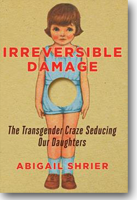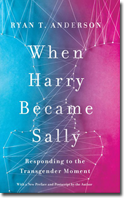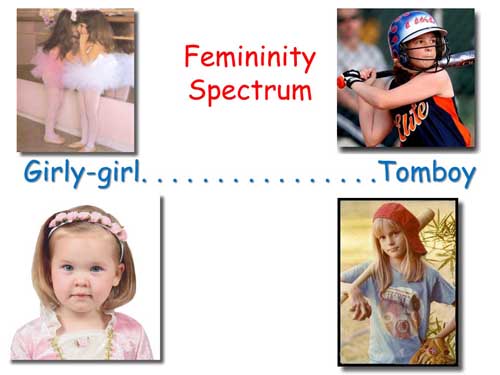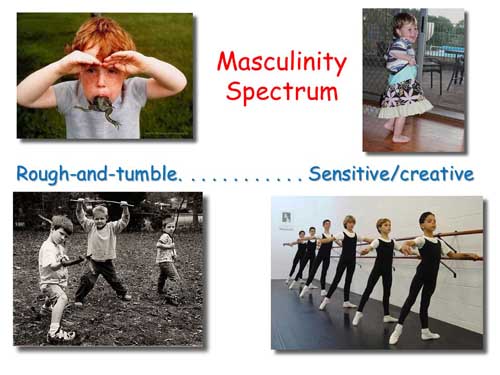Sue Bohlin suggests a biblical view of masculinity and femininity that encompasses the variety within two genders as God creates us.
How do you see the variations of gender in people? Many people automatically think of a single spectrum with masculinity on one end and femininity on the other.
 I don’t think that’s the way it works.
I don’t think that’s the way it works.
Consider the very first thing we encounter about gender in the creation account of Genesis 1:27—
So God created mankind in his own image,
in the image of God he created them;
male and female he created them.
Just two genders. No matter how many choices of made-up genders that Facebook used to offer.
We can look at the issue of gender spiritually by reading about how God created us male and female. We can also see the binary nature of gender by looking at biology. Male bodies produce small reproductive sex cells called gametes—sperm—and female bodies produce large gametes, eggs. There are no other options.
In this article we’ll be walking through a way of looking at gender that I believe faithfully reflects what God has revealed in His word about His design for us as human beings. Instead of a single spectrum with male and masculinity on one end and female and femininity on the other, I suggest there are two separate spectrums{1}: a masculinity spectrum and a femininity spectrum. God makes delightful variations in girls and women, and equally delightful variations in boys and men, all of us made in His image and created for His glory.
I suggest that God chooses where on each gender spectrum a baby comes into the world. It’s our starting point, but as we mature we can embrace and grow in the other characteristics of masculinity or femininity. We can take up more “bandwidth” and become a more fully-rounded man or woman.
One end of the masculinity spectrum, I suggest, are the rough-and-tumble boys who are constantly moving, playing sports, making noise, getting dirty, and can easily be emotionally clueless. On the other end of the spectrum are the sensitive, artistic, creative boys. And there’s everything in between.
On the femininity spectrum, we see girly-girls on one end, who love frilly clothes, playing with their doll babies, and in American culture are drawn to pink and purple and sparkly. On the other end are the tomboy jockettes who are often gifted athletes and natural leaders, and hate girly clothes. And, as with their brothers, there is everything in between.
Let’s explore these different gender spectrums and hopefully gain a fuller understanding of the goodness of God’s creation just the way He makes each one of us.
Masculinity Spectrum 1
I really like the idea that every child, created in his or her own individuality in the image of God, is a gift box that we as parents and care-givers get to open and discover what’s inside. Every child is fearfully and wonderful made, as we read in Psalm 139, and that includes the kind of boy and the kind of girl God chose for them to be. Whoever came up with the philosophy that children are blank slates that we write on, so they become whoever and however the surrounding culture instructs them to be, must have never been around actual children. Real babies come out of the womb and start revealing how God made them.
God shapes some baby boys as rough-and-tumble. They are often considered classically “all boy.” They’re constantly moving. Ask boys to walk from point A to point B and they may well zig-zag their way across the room. They often have an affinity for fighting and weapons. One mama who said no toy guns in her home because she hated violence, found her young son nibbling his toast into the shape of a pistol, which he pointed at his brother and made shooting sound effects. Her other son would treat the longest French fry from his Happy Meal like a miniature rifle to pretend-shoot his brother.
These rough-and-tumble boys are often emotionally clueless. They don’t mean to be insensitive, they just don’t pay much attention to non-verbal cues from other people. They tend to enjoy rough-housing with their daddies and with other boys. They will chest-bump and jostle each other in their male way of expressing friendship and affection. And these boys are drawn to contact sports, especially anything with balls.
God delights to make other boys, though far fewer of them, as sensitive, artistic, and creative. They are often gifted in the performing and visual arts, music, dance, drama, and design. They tend to experience life through a magnifying lens attached to their soul; everything is bigger, louder, and more vibrant. They can experience negative communications as more critical than they actually are. A parent’s frown may feel as devastating as a spanking.
They constantly scan their environment, sensing when others around them are upset. My husband can spot these sensitive boys at age two in the church nursery. He has seen boys drop whatever toy they had and go over to another toddler asking, “You okay? It’s okay.”
Many of them don’t care for sports, especially contact sports. Often they lack the eye-hand coordination needed for sports that utilize balls, rackets, clubs and other game equipment. They can do better at sports that scratch their competitive itch where they’re racing against the clock, like cross-country running.
And of course, there are boys (and men) everywhere in between as well. One of my sons was so sensitive and artistic he graduated with an art degree; the other puts himself square in the middle of the masculinity spectrum.
Masculinity Spectrum 2
We see the two kinds of boys and men in the account of Jacob and Esau in Genesis 25. Esau, the rough-and-tumble man, was a hunter, an outdoorsman. His twin brother Jacob was a mama’s boy, more interested in hanging back in the tents with his mother, in all probability the sensitive, artistic, creative type.
Since sensitive boys are in the minority, they often get bullied by the rough-and-tumbles or boys in the middle of the spectrum, and they can easily feel like they don’t fit, they don’t belong. They feel different from an early age.
These are the ones who are vulnerable to spiritual attacks of being labeled gay and other ugly words. In recent years, as sensitive, artistic and creative boys feel the pain of not fitting in, they are now being encouraged to label themselves as transgender. It used to be they would think, “I don’t fit in the world of boys. There’s something wrong with me.” Now they are being encouraged to think, “I don’t fit in the world of boys because I’m really a girl. Or life would be better and easier if I became a girl.” (Which, of course, is impossible.) Then if they accept these false labels and they practice seeing themselves that way, they can literally think themselves into a gay or trans identity. But it doesn’t have to be that way. Scripture tells us to “take every thought captive to the obedience of Christ” (2 Corinthians 10:5). All of us need to derive our identity from who God says we are.
Thinking of the masculinity spectrum, I like to ask, where would you put Jesus?
I think He embodies the entire spectrum. He was the best of rough-and-tumble men, strong and physically active; He started out as a carpenter or handyman, and men were drawn to Him. Was He artistic? Have you ever seen a sunrise or a sunset? Jesus paints the sky with glorious colors! Was He creative? Scripture tells us He was the Creator of the universe!
I have observed over years that as boys and men grow spiritually, they start taking up more bandwidth on the masculinity spectrum as they become more well-rounded. Rough-and-tumbles learn to listen and show compassion, and sensitives stretch out their comfort zone to take more initiative and reject passivity.
Rough-and-tumbles can become great leaders and servants as they use their strength to love and serve others. Sensitives can become great husbands, dads, pastors, counselors, and teachers as they use their gifts to love and serve others.
Femininity Spectrum 1
On the one end of the femininity spectrum are the girly-girls who come into the world wanting a pink receiving blanket and one of those headbands with a big puffy flower on their little bald head. They can’t wait till their fingernails and toenails are big enough for Mommy to paint. In American culture they often gravitate toward pink and purple and silver glitter. They cuddle baby dolls and stuffed animals.
One progressive-minded mother didn’t want to support gender stereotypes for her daughter, so instead of buying her stuffed animals and dolls, she gave her cars and trucks. One afternoon she saw her little girl lining up the cars and trucks, covering them with a blanket, and tenderly kissing them “night-night” as she put them down for a nap. Just as she would have with dolls and stuffed toys, if she’d been allowed to have them.
It’s easy to define feminine as girly-girls, but God loves and creates another kind of femininity.
He delights to make some girls tomboy jockettes. They have no interest in frilly clothes or makeup. They don’t care for skirts or dresses and in fact will often push back when required to wear “girl clothes.” For them, comfort is everything. You can find them outside climbing trees, shooting hoops, and perfecting their spirals. Some mechanically-inclined girls want to help their dads work on cars and lawnmowers. They tend to have no patience for girly-girl activities; girl drama drives them crazy. Barbie is stupid, and who wants to play house—nobody wins!
Many times they are gifted athletes, and often natural leaders.
Like sensitive boys, tomboys are outnumbered by girly-girls and those in the middle of the femininity spectrum. Being the minority, they are often bullied. They are judged and ostracized for not being like the other girls.
Sensitive boys and tomboy girls can get the message loud and clear that they don’t have what it takes to be a good boy or girl. They can conclude, wrongly, that they don’t belong in the world of boys, of girls. They burn with the shame of being “other than.” Different.
But God makes every person male or female on purpose, for His glory. They DO belong in the world of boys or girls, of men and women!
Femininity Spectrum 2
As girls grow spiritually, becoming more like Jesus, they can take up more bandwidth on the spectrum and become a more well-rounded expression of femininity.
Girly girls can put down their mirrors and selfies, and become prayer warriors and first responders. They can walk into emotional crises and hard conversations to point people to Jesus. They can become shepherds, more concerned about other people than themselves.
Tomboys can embrace the softer, more nurturing side of femininity. These girls often want to fight and defend those needing protection. They need to be introduced to spiritual warfare! Whether as a princess warrior or a warrior princess, the kingdom needs all girls and women to be fully engaged in fighting evil!
Many of the gender issues today are about stereotypes. People want to stick everybody in either a blue box or a pink box. They make sweeping generalizations like
• “Boys wear blue and brown and play with trucks and guns.”
• “Girls wear pink and purple and play with Barbies and jewelry making kits.”
But what if a boy thinks blue and brown are boring, and he loves pink and purple? Does it mean he’s gay? No! Jesus loves pink and purple! Have you ever seen a sunrise?
What if he doesn’t want to play tackle football? What if he’d rather sit and try to draw out another kid’s thoughts and feelings? Does it mean he’s gay? No! It may be a junior counselor in the making, who’s also going to be a fantastic daddy!
What if a girl thinks it’s just WRONG that she has to stay inside and learn to make gravy because Grandma says that’s what girls do, when there’s a broken carburetor outside she’s itching to get her hands on? What if she’s an amazing softball player? Does it mean she’s a lesbian? No! It means she’s a gifted mechanic or athlete!
Let’s forget the blue and pink boxes and just open the gift box that is each child and find out how God packed the gifts and interests inside. Let’s celebrate God’s good design of each child IN HIS IMAGE and affirm them as the child they are, even if they don’t conform to stereotypes.
Can you imagine how freeing it would be to celebrate the full spectrum of masculinity and femininity, and teach kids to appreciate and celebrate it in each other?
Notes
1. I do realize that the plural of spectrum is spectra, but most people don’t take five years of Latin like I did. For those who wince at my coining a word, my apologies.
©2024 Probe Ministries
 Abigail Shrier wrote about the transgender craze in her book Irreversible Damage: The Transgender Craze Seducing Our Daughters. When she joined me on my Point of View radio program, she explained that “gender dysphoria” was characterized by severe and persistent discomfort in one’s biological sex. It typically begins in early childhood. In previous generations, it afflicted a sliver of the population (roughly .01 percent) and occurred mostly in boys.
Abigail Shrier wrote about the transgender craze in her book Irreversible Damage: The Transgender Craze Seducing Our Daughters. When she joined me on my Point of View radio program, she explained that “gender dysphoria” was characterized by severe and persistent discomfort in one’s biological sex. It typically begins in early childhood. In previous generations, it afflicted a sliver of the population (roughly .01 percent) and occurred mostly in boys. Ryan Anderson is the author of the book, When Harry Became Sally: Responding to the Transgender Moment. He explains how transgender ideology promotes the opportunity for children to change their gender with surgery and drugs. And parents “are told that puberty blockers and cross-sex hormones may be the only way to prevent their children from committing suicide.”
Ryan Anderson is the author of the book, When Harry Became Sally: Responding to the Transgender Moment. He explains how transgender ideology promotes the opportunity for children to change their gender with surgery and drugs. And parents “are told that puberty blockers and cross-sex hormones may be the only way to prevent their children from committing suicide.”

 The cultural narrative has become, “LGBT represents normal, healthy variations in human sexuality, so everyone should support and celebrate all forms of sexual diversity. And if you don’t, we’re going to punish you, shame you, and squelch your voice.”
The cultural narrative has become, “LGBT represents normal, healthy variations in human sexuality, so everyone should support and celebrate all forms of sexual diversity. And if you don’t, we’re going to punish you, shame you, and squelch your voice.” When I use the term “gender spectrum,” you might think in terms of masculinity on one end and femininity on the other. We hear men being prompted to “get in touch with your feminine side.” (For some reason, women never seem to be exhorted to “get in touch with your masculine side.” Huh.)
When I use the term “gender spectrum,” you might think in terms of masculinity on one end and femininity on the other. We hear men being prompted to “get in touch with your feminine side.” (For some reason, women never seem to be exhorted to “get in touch with your masculine side.” Huh.)
